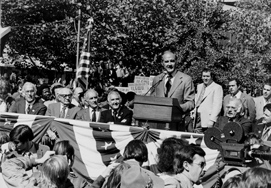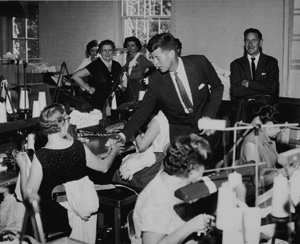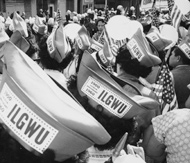

History of the ILGWU
Seasoned Political Players

By the 1930s, with nearly a quarter of a million members, the ILGWU was one of the most powerful unions in the United States. Beginning in this period, the union became increasingly involved in domestic partisan politics and international affairs.
David Dubinsky led the union through this change when, in anticipation of the 1936 presidential election, he left the Socialist Party and gave his support to Franklin D. Roosevelt. With the formation of the American Labor Party in the summer leading up to the election, several ILGWU leaders became officers in the new party. Vice President Luigi Antonini was named state chairman and David Dubinsky was finance chairman. Local 10 manager Isidore Nagler, Local 22 manager Charles Zimmerman, and Executive Secretary Frederick Umhey were also involved in the early work of the American Labor Party. By 1944 the ALP was politically divided, and compelled by Dubinsky's virulent anti-Communism, the ILGWU withdrew its support of the party.

After leaving the American Labor Party in 1944, David Dubinsky and Alex Rose worked to form and then co-chair the Liberal Party. With the support of the ILGWU and others, the party backed candidates in state and national elections. In many instances, the party was aligned with Democratic candidates, and the ILGWU sometimes hosted major figures from the Democratic Party at union events. In 1962, for example, John F. Kennedy was on hand to ceremoniously open the ILGWU's cooperative housing at Penn Station South, and in 1964, Lyndon B. Johnson gave a speech to observe the 50th anniversary of the Union Health Center's opening. The ILGWU maintained its support for the Liberal Party from its founding and throughout the 1950s. With David Dubinsky's retirement in 1966, the ILGWU's involvement with the Liberal Party waned, and by 1969, the ILGWU had disaffiliated from the party.
In addition, the ILGWU's Legislative and Political Department participated in many domestic electoral efforts. Under the longtime direction of Evelyn Dubrow in Washington, D.C., the department worked with local unions also coordinating activities on the municipal and state levels. Representatives from this department and other ILGWU officers gave testimony before the U.S. Congress on a variety of topics relating to international trade, workplace conditions, and other labor issues.
On the international scene, in the years leading up to the United States' involvement in World War II, the ILGWU collaborated with other labor organizations, such as the Jewish Labor Committee and the Italian-American Labor Council, to oppose the rise of fascism and Hitler in Europe. In the post-war period, the ILGWU and these organizations provided services to people displaced by the war. Also, the ILGWU was closely involved with the AFL's formation of the Free Trade Union Committee which worked to establish and support trade unions that were not Communist in Europe and decolonizing countries.


